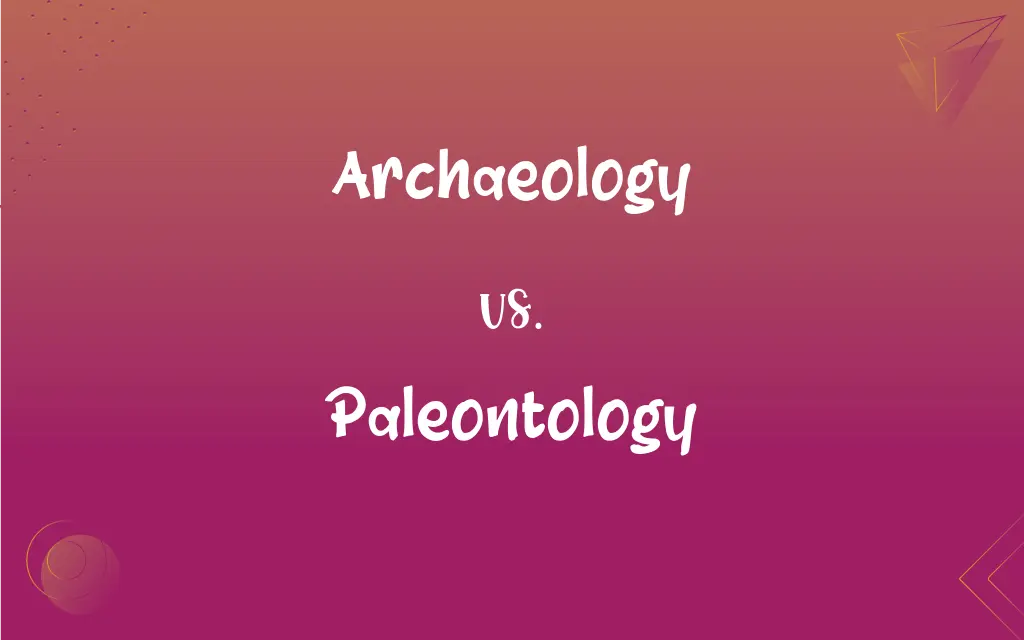Archaeology vs. Paleontology: What's the Difference?
Edited by Harlon Moss || By Janet White || Published on November 10, 2023
Archaeology studies human history through artifacts; Paleontology studies prehistoric life via fossils.

Key Differences
Archaeology and Paleontology are two distinct disciplines within the study of the past. Archaeology primarily focuses on understanding human culture and civilization by examining artifacts, structures, and other remains left behind by ancient and historical human societies. Paleontology, on the other hand, is the study of the history of life on Earth, primarily through the examination of fossils.
In the field of Archaeology, researchers might excavate ancient ruins to understand the day-to-day life, religious practices, or trade networks of ancient civilizations. Paleontology, however, delves into the evolutionary history, often piecing together the timeline and development of life forms ranging from tiny microorganisms to massive dinosaurs.
Archaeology can offer insights into the development of languages, the rise and fall of empires, or the migration patterns of ancient peoples. Paleontology provides a broader scope, looking at vast epochs of time and analyzing the evolution, extinction, and diversification of life forms across different geological periods.
While both Archaeology and Paleontology are grounded in the physical remnants of the past, their tools and methodologies often differ. Archaeologists might use carbon dating to determine the age of an artifact, while paleontologists might use stratigraphy to date a fossil. Both disciplines, however, strive to reconstruct and interpret the past from the clues left behind.
Comparison Chart
Main Focus
Studies human history and culture
Studies history of life on Earth
ADVERTISEMENT
Key Evidence
Artifacts, buildings, and human remains
Fossils of plants, animals, and microorganisms
Timescale
Typically spans from the emergence of humans to present
Spans much of Earth's history
Methods
Excavation, carbon dating, analysis of artifacts
Stratigraphy, fossil analysis
Professional Role
Archaeologist
Paleontologist
Archaeology and Paleontology Definitions
Archaeology
Archaeology analyzes ancient structures and artifacts to reconstruct human history.
The pyramids of Egypt are prime subjects of Archaeological study.
ADVERTISEMENT
Paleontology
Paleontology decodes Earth's biological history by examining preserved remains from different eras.
Trilobites found in rocks are Paleontological evidence of ancient marine life.
Archaeology
Archaeology is the study of past human civilizations through the examination of their material remains.
Through Archaeology, we discovered that ancient Romans had an intricate plumbing system.
Paleontology
Paleontology reconstructs the lineage and lifeways of extinct creatures from their preserved traces.
Through Paleontology, we learned that woolly mammoths coexisted with early humans.
Archaeology
Archaeology is the discipline of uncovering the story of humanity by sifting through its physical past.
Through Archaeology, the mystery of Stonehenge continues to be explored.
Paleontology
Paleontology investigates the evolution and behavior of organisms by analyzing ancient remains.
Paleontology helps us understand how birds evolved from certain dinosaurs.
Archaeology
Archaeology deciphers ancient societies by analyzing their tools, buildings, and artworks.
Native American pottery gives Archaeologists insight into indigenous cultures and practices.
Paleontology
Paleontology is the scientific study of the history of life on Earth through fossils.
The T-Rex skeleton in the museum is a result of Paleontological research.
Archaeology
Archaeology seeks to understand human behaviors, cultures, and evolution by investigating what they left behind.
Archaeological digs in Pompeii reveal details about daily Roman life.
Paleontology
Paleontology is the branch of science focused on understanding life's chronicle, primarily via fossil evidence.
Amber containing an ancient mosquito is a treasure in Paleontology.
Archaeology
The systematic study of past human life and culture by the recovery and examination of remaining material evidence, such as graves, buildings, tools, and pottery.
Paleontology
The study of the forms of life existing in prehistoric or geologic times, as represented by the fossils of plants, animals, and other organisms.
Archaeology
The study of the past by excavation and analysis of its material remains:
Paleontology
(American spelling) Study of the forms of life existing in prehistoric or geologic times, especially as represented by fossils.
Archaeology
The actual excavation, examination, analysis and interpretation.
The building's developers have asked for some archaeology to be undertaken.
Paleontology
The science which treats of the ancient life of the earth, or of fossils which are the remains of such life.
Archaeology
The actual remains together with their location in the stratigraphy.
The archaeology will tell us which methods of burial were used by the Ancient Greeks.
Paleontology
The earth science that studies fossil organisms and related remains
Archaeology
The academic subject; in the USA: one of the four sub-disciplines of anthropology.
She studied archaeology at Edinburgh University.
Archaeology
The science or study of antiquities, esp. prehistoric antiquities, such as the remains of buildings or monuments of an early epoch, inscriptions, implements, and other relics, written manuscripts, etc.
Archaeology
The branch of anthropology that studies prehistoric people and their cultures
FAQs
What does Archaeology study?
Archaeology studies human history and culture through artifacts and remains.
What does Paleontology focus on?
Paleontology focuses on studying the history of life on Earth using fossils.
Do paleontologists only study dinosaurs?
No, paleontologists study all ancient life forms, from microorganisms to plants and animals, not just dinosaurs.
Do Archaeology and Paleontology use similar methods?
While both disciplines analyze ancient evidence, their methods and techniques can differ considerably.
Are all human bones of interest to archaeologists?
Not necessarily; Archaeologists are primarily interested in human remains that can provide insights into past cultures and civilizations.
How do paleontologists know what extinct animals ate?
Paleontologists infer diets from dental structures, fossilized feces, and sometimes preserved contents within the fossilized stomachs.
How old are the artifacts studied in Archaeology?
Archaeological artifacts can range from recent history to millions of years old, spanning the entirety of human existence.
How do archaeologists date their findings?
Archaeologists often use techniques like carbon dating, dendrochronology, and stratigraphy to date artifacts.
Do paleontologists look for DNA in fossils?
While most fossils don't contain preserved DNA, some exceptionally well-preserved specimens can, and researchers may attempt to extract it.
Are all fossils of interest to paleontologists?
While most fossils offer valuable insights, paleontologists might prioritize those that fill evolutionary gaps or offer new information.
Can Archaeology tell us about pre-human history?
Archaeology primarily focuses on human history, but the study of very early tool use can shed light on human ancestors.
Can Paleontology tell us about human evolution?
Yes, paleontologists study hominid fossils to trace the evolution of our human ancestors.
Can Paleontology provide information on ancient climates?
Yes, Paleontology can offer insights into ancient ecosystems and climates by studying fossilized plants and animals.
Do archaeologists only dig sites?
No, while excavation is a method, archaeologists also study existing structures, artifacts, and landscapes without digging.
Can Paleontology tell us about the future?
Paleontology helps understand past ecological and evolutionary trends, which can inform predictions about future biological changes.
What challenges do paleontologists face in their work?
Paleontologists grapple with issues like fossil preservation, incomplete records, and interpreting ancient environments.
Why is Archaeology important for history?
Archaeology provides tangible evidence of past human behaviors, societies, and events, offering a direct window into history.
How do archaeologists preserve their finds?
Archaeologists use a variety of techniques, including stabilizing, cleaning, and storing in controlled environments.
What tools are commonly used in Archaeology?
Tools range from brushes, trowels, and sieves for excavation to software for data analysis.
Do paleontologists work with other scientists?
Yes, paleontologists often collaborate with geologists, biologists, and other experts to gain a fuller understanding of ancient life.
About Author
Written by
Janet WhiteJanet White has been an esteemed writer and blogger for Difference Wiki. Holding a Master's degree in Science and Medical Journalism from the prestigious Boston University, she has consistently demonstrated her expertise and passion for her field. When she's not immersed in her work, Janet relishes her time exercising, delving into a good book, and cherishing moments with friends and family.
Edited by
Harlon MossHarlon is a seasoned quality moderator and accomplished content writer for Difference Wiki. An alumnus of the prestigious University of California, he earned his degree in Computer Science. Leveraging his academic background, Harlon brings a meticulous and informed perspective to his work, ensuring content accuracy and excellence.






































































